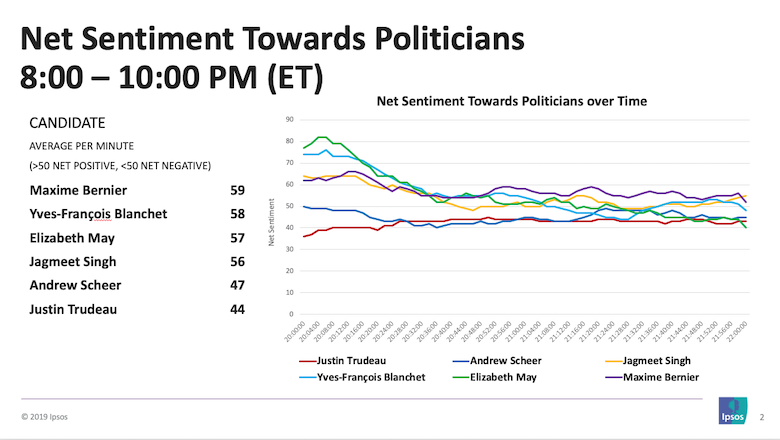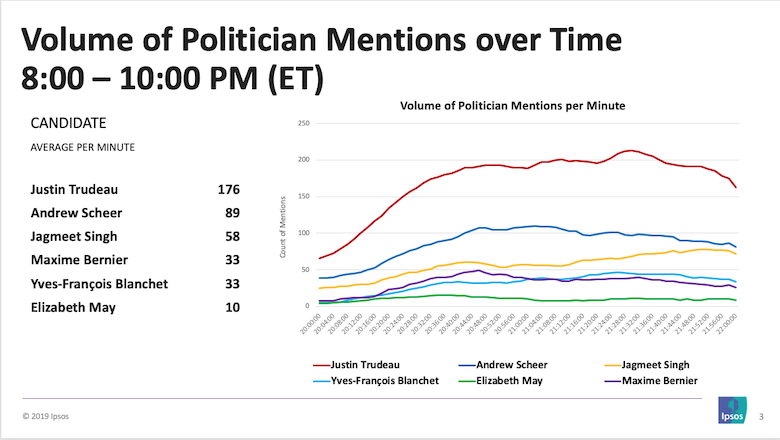The final debate of the 2019 election had no clear winner, according to Twitter, as most comments during the debate focused on Liberal Leader Justin Trudeau.

The Ipsos Canadian Political Atlas measured real time conversation on Twitter during the French-language debate on Oct. 10 from 8 to 10 p.m. Political Atlas also measured conversation across Canada, not just in Quebec, where results may have been different.
Four party leaders averaged a net positive score during the debate. People’s Party Leader Maxime Bernier had the highest average net rating, followed by Bloc Québécois Leader Yves-François Blanchet, Green Party Leader Elizabeth May, and NDP Leader Jagmeet Singh. All four finished in net positive territory, above 50 per cent.
The two major party leaders, Justin Trudeau of the Liberals and Andrew Scheer of the Conservatives, had average net sentiment ratings below 50 per cent.
The results for average net sentiment rating by leader were: Maxime Bernier, 59 per cent; Yves-François Blanchet, 58; Elizabeth May, 57; Jagmeet Singh, 56; Andrew Scheer, 47; and Justin Trudeau, 44.
Sentiment measures attitudes towards the parties and leaders. A sentiment rating over 50 is “net positive,” while a sentiment rating of less than 50 is “net negative.”
A small group of dedicated supporters or detractors on Twitter can drive sentiment into positive or negative territory, so it is important to consider volume as well as sentiment.
Trudeau led on volume with an average of 176 impressions per minute. Scheer was a distant second with 89 average impressions per minute. As in the English debates, May was virtually invisible on Twitter with only 10 average impressions per minute.
On both sentiment and volume, there were two clear clusters: those around Trudeau and Scheer, who both had the most volume and the least favourable sentiment, and the other four leaders who had much less volume but more positive sentiment.
The data suggests that Twitter users were most focused on the two main party leaders — Trudeau and, to a lesser extent, Scheer — as voters begin to consider the implications of their vote in a little over a week.
Meanwhile, the positive momentum of the NDP’s Singh continued. Although he did not emerge as a clear winner the way he did according to Twitter data from Monday’s English debate, he performed well.
- Trudeau tight-lipped on potential U.S. TikTok ban as key bill passes
- Canadian man dies during Texas Ironman event. Her widow wants answers as to why
- Hundreds mourn 16-year-old Halifax homicide victim: ‘The youth are feeling it’
- On the ‘frontline’: Toronto-area residents hiring security firms to fight auto theft
COMMENTARY: Singh scores win with ‘sentiment’ jump on Twitter during Monday’s English debate, Ipsos says
The data also suggests that Bloc’s Blanchet continues to move opinion, at least on Twitter. His strong showing on sentiment demonstrates that Twitter users are listening to his message, and for some it is a positive one.
All of this comes at the expense of Trudeau and Scheer, who both need seats in Quebec to compete for a majority government. An increased Bloc presence in the House of Commons makes that possibility less and less likely. While Singh appears to have maintained positive social media reaction and kept himself and his party in the conversation, it’s unclear whether that will translate into votes.
Finally, Bernier, the People’s Party of Canada leader, continued to outperform his party’s polling numbers on Twitter. Bernier garnered a good share of positive Twitter reaction and decent volume. His message was heard by Twitter users at the final debate in French, a language in which he is most comfortable.
Voters are now considering whether to support one of the two major parties, neither of which they express positive sentiment about, or to throw their support behind one of the other parties. And if the data on Twitter is to be believed, they have many positive reactions to those.
Twitter data is only an indication of what some voters are talking about online, and as mentioned, the data from the French debate is from across Canada and not just in Quebec. Ipsos will continue to poll Canadians through the weekend and get a sense of whether this week’s two debates have had a lasting impact on voting intentions.
The leaders’ debates may be over, but as families gather for the long Thanksgiving weekend, it seems Canadians are not done debating among themselves which of the leaders and parties deserve their votes.
At the moment, none of the leaders are making that decision an easy one.
These are findings from the Canadian Political Atlas Debate Dashboard, an online social media monitoring tool that measured Twitter sentiment and volume through the debate. The data are not representative of the Canadian population, and reflect only social media activity online. Data was collected between 8:00 p.m. and 10 p.m. on Oct. 10, 2019.
Gregory Jack is vice-president of Ipsos Public Affairs.












Comments